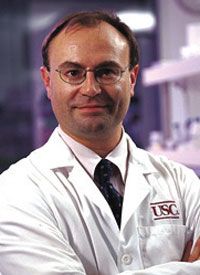Outcomes Remain Similar Following 80405 RAS Analysis
All patients with metastatic colorectal cancer should undergo RAS mutation testing to ensure optimal patient selection for EGFR inhibitor therapy.
Heinz-Josef Lenz, MD from USC

All patients with metastatic colorectal cancer should undergo RAS mutation testing to ensure optimal patient selection for EGFR inhibitor therapy, according to a study1 reported at the 2014 ESMO Congress meeting held in Madrid, Spain.
Expanded mutation analysis of data from a cooperative-group trial failed to distinguish patients more likely to benefit from treatment with chemotherapy plus an EGFR inhibitor from those more likely to benefit from chemotherapy plus a VEGF inhibitor. Patients with RAS wild type tumors had similar progression-free and overall survival with chemotherapy plus bevacizumab or chemotherapy plus cetuximab.
Data mining and analysis of the CALGB/SWOG 80405 trial remains a work in progress, said Heinz-Josef Lenz, MD, director of clinical research and co-leader of the gastrointestinal cancers program at the University of Southern California Norris Comprehensive Cancer Center.
"Overall survival greater than 30 months in both arms sets a new benchmark for patients with metastatic colorectal cancer, which was achieved across a broad clinical trials network and suggests that the results apply in a variety of practice settings"; said Lenz.
With additional data such as dose intensity, treatment duration, location, tumor shrinkage, second-line therapies, and additional biomarkers for anti-EGFR and anti-VEGF therapies, "we might better understand how to optimize therapy" he added.
The 80405 trial involved patients with KRAS codon 12/13 wild-type metastatic colorectal cancer. The patients received either FOLFOX or FOLFIRI chemotherapy and were randomized to bevacizumab or cetuximab. The results showed no difference in PFS or overall survival between treatment groups.
Lenz presented results of expanded mutation analysis by BEAMing (beads, emulsion, amplification, and magnetics) methodology to identify additional activating mutations on other codons associated with resistance to EGFR inhibitors. BEAM technology is used for the identification and quantification of rare mutations as well as to study variations in gene sequences. Investigators in 80405 re-evaluated outcome data after excluding patients whose tumors had mutations identified by BEAMing.
The trial included 1,137 randomized patients, 660 of whom were evaluable for RAS status. The initial mutation analysis showed that 256 patients in the bevacizumab arm had RAS wild type tumors and 42 had RAS-mutant tumors. In the cetuximab arm, 270 patients had wild-type tumors and 53 had tumors with RAS mutations.
The expanded mutation analysis identified KRAS/NRAS mutations in an additional 15.3% of tumors.
After accounting for the additional mutations, overall survival and PFS did not differ significantly between the bevacizumab and cetuximab groups, a repeat of the initial analysis. Among patients with RAS wild-type tumors, median overall survival was 31.2 months with chemotherapy plus bevacizumab and 32.0 months with chemotherapy plus cetuximab. Among patients with RAS mutations, overall survival was 22.3 months with bevacizumab and 28.7 months with cetuximab, a nonsignificant difference.
Median PFS also did not differ between treatment groups after BEAMing. Patients with wild-type tumors had a median PFS of 11.3 months with bevacizumab and 11.4 months with cetuximab.
Analysis by type of chemotherapy (FOLFOX versus FOLFIRI) also showed no significant differences between the addition of bevacizumab or cetuximab.
Another presentation at ESMO focused on outcomes among 80405 patients who underwent surgery as part of their treatment. Specifically, the analysis examined the impact of achieving NED (no evidence of disease) status with surgery.2
The analysis comprised 132 patients who had wild-type tumors. Consistent with the overall results, the subgroup analysis showed no significant difference in median disease-free survival (DFS) for patients randomized to bevacizumab (18.9 months) or cetuximab (15.3 months).
Despite the lack of difference in DFS, substantially more patients in the cetuximab arm were rendered NED by surgery, an intriguing finding that warrants further study, said Alan Venook, MD, a professor of medicine at the University of California, San Francisco.
After BEAMing, the surgical subgroup included 76 patients who were evaluable for mutation status. The 65 patients with wild-type tumors had a median overall survival of 78.8 months as compared with 47.9 months for 11 patients with mutant tumors. Although the difference did not reach statistical significance (P=0.2), Venook said the small numbers probably obscured the difference between the groups.
"This study provided more questions than answers," said Venook. "Why were cetuximab-treated patients more likely to go to resection? Are the less common RASmutations more powerful as drivers of prognosis? Do mutations have a different impact earlier or later in the course of the disease?"
Reference:
- Lenz H, Niedzwiecki D, Innocenti F, Blanke C, Mahony MR, et al. CALGB/SWOG 80405: Phase III trial of irinotecan/5-FU/leucovorin (FOLFIRI) or oxaliplatin/5-FU/leucovorin (MFOLFOX6) with bevacizumab (BV) or cetuximab (CET) for patients with expanded RAS analyses untreated metastatic adenocarcinoma of the colon or rectum (mCRC). Presented at: Presented at: ESMO Congress 2014: September 26-30, 2014.
- Venook A, Niedzwiecki D, Lenz H, Mahoney M, Inncenti F, O'Neil B, et al. CALGB/SWOG 80405: Analysis of patients undergoing surgery as part of treatment strategy. Presented at: Presented at: ESMO Congress 2014: September 26-30, 2014.